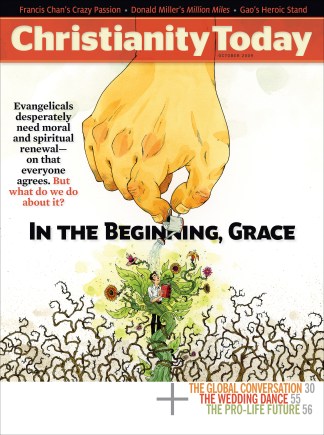“Yes, I think they should be church plants. I don’t think there is the ability to bear one another’s burdens when you never meet in the same location. And when you’re showing a pastor on the screen yet have a campus pastor: is the campus pastor not fit to teach? If he is, then why is he not teaching? A church plant would be better.”Thomas White, associate professor of systematic theology, Southwestern Baptist Theological Seminary
“I’m not sure that multisite is helping church planting. My concern is that pastors may opt for a multisite approach instead of church planting. Multisite addresses the geographical limitations of a church. But a planted church is more contextually relevant. We really need to do some research. Multisite is too new to know the impact yet.”Aubrey Malphurs, president, Malphurs Group
“It’s a both/and world. We need church plants and multisite. Multisites are a great way for churches to reach a broader geographic or demographic area by changing worship and ambience. It depends on leadership. If I have a gifted communicator, I tell them to plant. If I have someone who is a good shepherd, I suggest a multisite.”Larry Osborne, teaching pastor, North Coast Church, Vista, Calif.
“Theologically, I am not sure that those satellites are NOT churches already. They can be churches but still be connected. Either way, in many cases, churches once engaged in church planting have transitioned to starting sites. I believe that if they are going to do multisite, they should do both—start sites and start churches. There are some good examples doing both.”Ed Stetzer, president, LifeWay Research
“We draw too solid of a line between what is a campus and what is a church plant. Seacoast has a campus 200 miles away with a pastor, small groups, children’s ministry, etc. They are resourced and governed differently, but I don’t see a distinction between the two.”Geoff Surratt, pastor of ministry, Seacoast Church, Mount Pleasant, S.C.
“Multisite is a step towards church planting. We can develop leaders in all areas of ministry while maintaining a smaller gathering size. It gives us all the benefits of a church plant without most of the risk. It’s something new in a new space, yet doesn’t have to be instantly self-sustaining.”Bob Hyatt, pastor, the Evergreen Community, Portland, Ore.
“We see multisite campuses as another form of church planting now. If the goal of a church is to make disciples and to multiply, then we can do that in a number of ways. Planting from a respected network or from a known church as a multisite gives them credibility, which allows leaders to make and gather disciples more effectively. Disciples gathered will become a church.”Scott Thomas, director, Acts 29 Network
“They are not mutually exclusive strategies. But some churches are doing multisite rather than church planting because younger pastors express a very deep desire to do life and ministry together. They feel a multisite structure enhances that, and church planting detracts from that. When a church spins off a plant, almost inevitably that plant will sever many relationships with the mother church as it becomes autonomous.”Gregg Allison, professor of Christian theology, Southern Baptist Theological Seminary
“Many multisite churches actually do both. They have campuses and they plant, usually based on geography. If beyond a certain distance from the original campus, it often makes better sense to be a plant. The benefit of a campus is on-going support and investment. The stats on planting are not great in terms of experiencing long-term growth and health. The success rates of campuses are strong.”Greg Ligon, vice president, Leadership Network
“Multiplying campuses is not an alternative to church planting; it is an alternative to multiplying services, building a larger building, or turning people away. And it actually fosters church planting by providing a leadership pipeline for church planters. For us, the argument comes down not on whether you do multi-campus but how it is done. Many multisite environments encourage consumerism, foster anonymity, and are built on a cult of personality. We believe there is a way to do it, however, that is God-honoring and that conforms to the highest ideals of what the New Testament says a local church should be.”J.D. Greear, lead pastor, The Summit Church, Durham, N.C.
Copyright © 2009 Christianity Today. Click for reprint information.
Related Elsewhere:
Christianity Today earlier covered satellite campuses in 2005, and recently profiled one of its most prominent proponents, Joel Hunter.
Out of Ur, the blog of Christianity Today sister publication Leadership Journal, has publishedseveralposts on multi-site and video-venue churches. Leadership has also publishedseveralarticles on the subject.










